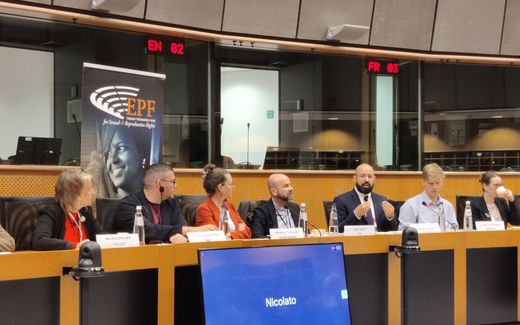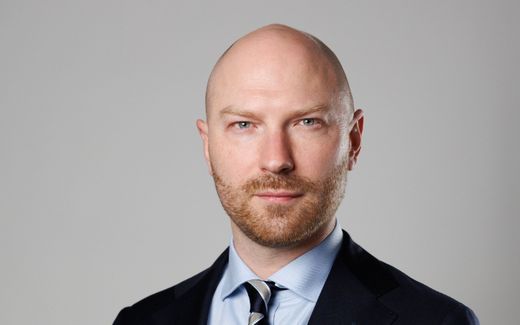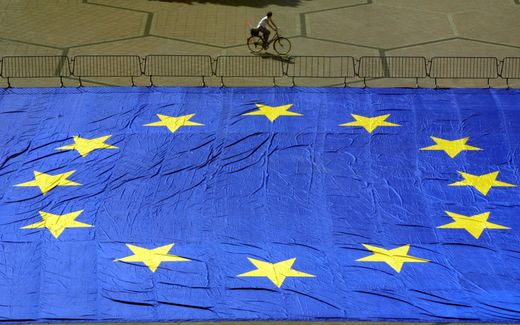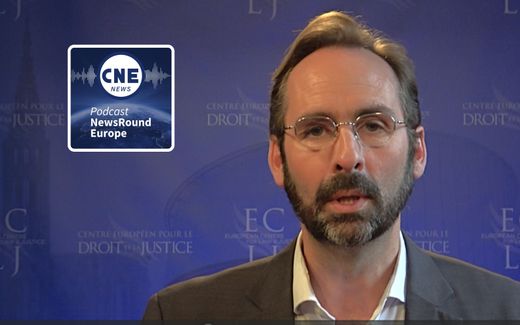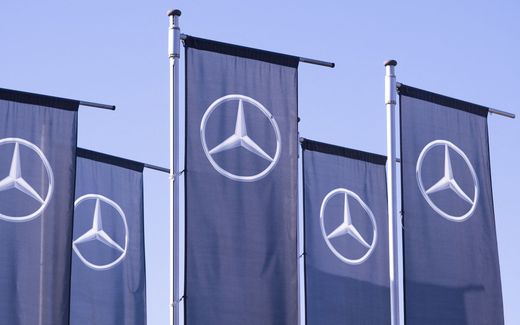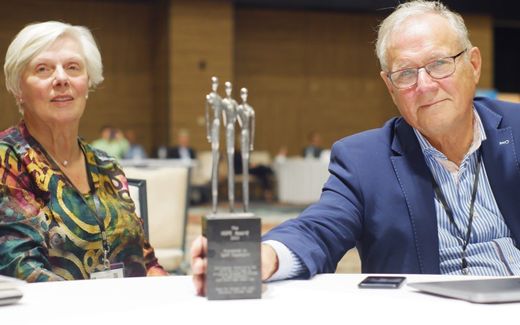Review: Christian “extremists” are overtaking power in Europe, new report claims
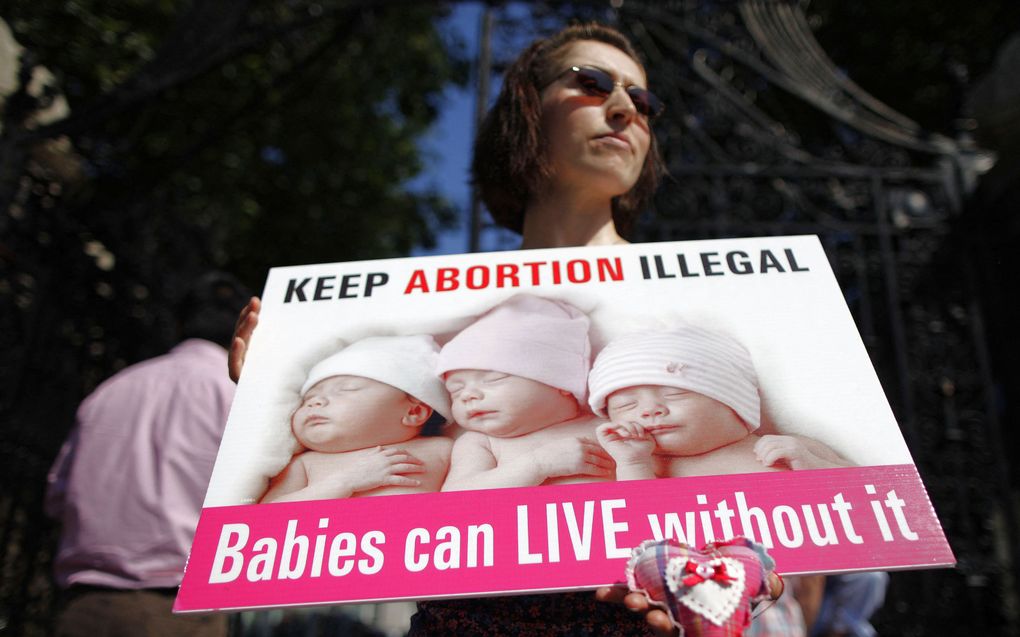
Battle against abortion in Ireland. Photo AFP, Peter Muhly
European Union
Dear Christians, don’t complain any longer. You are growing stronger and have an endless supply of money. Believers endanger the secularist state. Therefore, a new report from Brussels has sounded the alarm. Here is an analysis with a firm conclusion: Disinformation.
Stay up to date with Christian news in Europe? Sign up for CNE's newsletter.
The Sexual Revolution has lost the battle in Europe. On the contrary, sexual liberty and reproductive health and rights are eroding, says the report called The Next Wave: How Religious Extremism Is Reclaiming Power.
It offers an investigation of the resurgence of religious extremism in Europe. The “anti-gender” movements have stepped out of the political margins to the heart of institutional power. Their people are strategically positioned and are busy dismantling rights that have been fought for by decades. And believe it or not, they are increasingly effective, the report’s authors warn.
The report was edited by Neil Datta, the head of the EPF (European Parliamentary Forum for Sexual and Reproductive Rights), and published in mid-June. The EPF is a network of members of parliament from EU member states who focus on sexual and reproductive rights (SRHR).
The report follows up on earlier reports. In 2021, EPF published “Tip of the Iceberg,” in which money flows were already mapped. The new report gives an update on developments between 2019 and 2023.
Another report with more or less the same conclusions was published last year: “The Christian Right in Europe”. At the presentation of that report in the European Parliament, MEP Sophie in ’t Veld spoke about “a worrying trend” that Christians were increasingly able to organise themselves, as reported by CNE.
EPF is financed by organisations like the Bill & Melinda Gates Foundation, IPPF (International Planned Parenthood Foundation), and Soros’s Open Society; all organisations that are at odds with the European pro-life movement. With those donors, it is clear what EPF is standing for: free abortion as a fundamental human right. And more: this human right should be the yardstick to measure our civilisation.
The report identifies a total of 1.18 billion US dollars in funding for anti-gender activism in Europe over five years (271 million each year). This sum goes around in 270 organisations. Three-quarters of them (73 per cent) originate from Europe. One-fifth (18 per cent) is sent from Russia. One in ten (9 per cent) comes from US-based actors. The top European sources include Hungary, France, the UK, Poland and Spain. (By the way, the whole report works with US dollars, not euros.)
With all this money, the “religious extremism” can buy a strong influence. Religious organisations are no longer just lobbying; they are taking over complete institutions, including media platforms, schools and political parties, the report says.
It also praises the professionalism of those extremists. They are no longer locked in small villages but are as international as their cosmopolitan adversaries. They speak their languages and are otherwise professional too. By doing this, they can shape policy and organise sophisticated disinformation campaigns.
What are the biggest wrongdoers according to this report? Here are a few:
- The French Fondation Jerome Lejeune (FLJ);
- European Conservatives and Reformists Group (ECR) in the European Parliament;
- European Christian Political Party (ECPP, until recently known as Movement and ECPM);
- Alliance Defending Freedom International (ADFI);
- European Centre for Law and Justice (ECLJ, the European branch of the American Center for Law and Justice, ACLJ).
In terms of countries, the report identifies Hungary as the epicentre of the anti-gender coalition. Under Prime Minister Viktor Orbán, religious extremism has changed into state policy, the report’s authors conclude.
The report concludes that sexual freedom, gender equality and women’s empowerment are in a dangerous phase. And therefore, the alarm is sounded.
Observations
The report is full of heavy terminology and far-reaching accusations. Its style is not cautious but utterly bold.
In terms of definitions, the methodology is not very clear. Only the word “anti-gender” is defined (page 9): “Those associations, businesses, political parties and other organisations that are engaged in undermining sexual and reproductive health and rights (SRHR), LGBTQI rights, children’s rights, and policies and social attitudes favouring gender equality.”
Other keywords, however, should have been better described, like “democratic” and “anti-democratic”, “religious extremism” and “far-right”.
Using all those terms seems consistent from page 1 to page 160. From A to Z, it very clearly sums up all the dangerous organisations in the world.
This type of vocabulary has another side, too. There are no greys in this report. You are either black or white. This world is simple and not complex.
Nuances would have left the story less powerful; that is clear. For instance, is “natural family planning” really anti-gender? It is presented as comparable to conversion therapy for LGBT people. But is it not for the women themselves to decide whether the pill serves their goals or not? And if they come to another choice, are they misled?
The same applies to abstinence-based education. One can make another choice, but it seems that the threshold for calling something anti-gender is really low. Abstinence is neither extremist nor dangerous for this free world, is it?
The report gives the impression—although it never explicitly says that—that all those organisations work together as one force. Many Christians would love that this would be reality, but it is not. Sometimes, it is even the opposite, which slows the effectiveness of the activities.
The 270 organisations mentioned are not described with their self-chosen identities but are branded just as “anti-rights” actors. In this report, you learn nothing about the goals the organisations see for themselves. You neither know what their motives are, their worldview, or anything. They are just “anti”, which means, shortly, “anti” the thing that EPF wants: free abortion and related LGBT rights.
This focus on free abortion and the related liberties sometimes leads to a sort of obsession. For instance, the report says that in Russia, anti-abortion is linked to pro-family and demography. Everybody who knows the situation in Russia can understand this. The family provides much more protection there than the state or any other institution in the country. And why is it suspicious that a country pays much attention to demography if its population is shrinking?
The report leaves the impression that demography and family are invalid interests, and that anyone prioritising them over “rights” like abortion is an extremist. But no doubt, sooner or later, the issue of demography will come to Western Europe too.
According to the authors, this focus on pro-family and demography policy connects the Russian President Putin to other “anti-gender leaders” as Orbán and US President Trump (page 33). Whether Trump has a pro-family and demography policy is debatable, but Orbán really does. The suggestion is that Trump, Orbán and Putin are on the same block, working together to create a worse world. In short, whoever is against abortion and LGBT rights must be pro-Russian and authoritarian, according to the report.
Also noticeable is that when those so-called anti-gender organisations say something in the eye of the common good, they act as a “wolf in sheep’s clothing”, as it says in one of the chapter titles in the report. In other words, sometimes, these professional extremists sound reasonable. But the only reason is that they are good at translating their goals into secularised language. So, when they speak about religious freedom, EPF knows that they only want to curb women’s rights.
This is, of course, quite black and white. But is it convincing? Not really.
Factual errors
When reading such a report, you always encounter a few situations you know better than others. Those help to check whether the authors were accurate with facts or not. Let’s have a look at a few.
The report mentions the “Dutch Reformed Church” several times in relation to my country. In reality, this denomination (Nederlandse Hervormde Kerk) ceased to exist in 2004. And if it still existed, it would not have done the things mentioned in the report.
One could say: the name Dutch Reformed Church could also be used as a term for a larger family of smaller denominations. Indeed, it would be possible to point to a group of churches. However, those Calvinist churches still would not support the European Christian party. Another factual error.
The authors could also have written: People who belong to one of the Dutch Reformed churches also support one of the national parties that form the ECPP. But that would make the report wordy and vague. And the authors have done everything to avoid precisely that. The report is a piece of art painted with broad strokes, which is why it sounds powerful, although it is not accurate regarding details.
The authors refer to the controversy surrounding the Nashville Declaration in early 2019 in the Netherlands. Some people from the Reformed and Evangelical community thought this Declaration was a good start for academic debate about the Christian view on marriage. It is wrong that this was “officially endorsed” and that it became a “key ideological reference.” The opposite is true: most people distanced themselves from it and kept silent about it, and so “Nashville” became, in fact, taboo.
Footnote 29 (page 18) discusses “the late Rocco Buttiglione”. In an email to CNE.news, the Italian philosopher and politician writes that the news of his passing away “is slightly exaggerated,” showing that he is still alive.
Also, CNE.news is mentioned in the report, although the full name is mentioned as “Christian News Europe” instead of “Christian Network Europe” (page 118). CNE is launched by actors linked to the parties Christian Union (CU) and the Reformed SGP party. It might be true that the actors are members of those parties privately, but officially, there are no links. CNE is an independent journalistic platform.
The report points to one of our first articles in September 2021, Five Reasons Why Russian Christians Love Putin. According to the authors, CNE “praised the Russian president for his ostensible piety and his government’s ban on gay propaganda.” This is either a misunderstanding or a matter of misleading. The article lists five reasons, and the second of them is that Putin is supported for his anti-gay propaganda. That is a journalistic style. The article was not meant to say that this was right or wrong.
Another place, CNE.news is called “a religious fundamentalist news outlet” (page 38). Usually, the word “fundamentalist” is not a word we would use ourselves since it sounds pretty negative. But it is fine if the authors mean that we focus on Christian values as profitable for society and that Jesus Christ is the Way, the Truth, and the Life.
No choice
The report writes about many pro-life organisations, but it never calls them that. The word that is used is “anti-choice”. This is because the message of this report seems to be quite outspokenly pro-choice. Calling the other “anti-choice” is a sort of campaign language that proponents of unrestricted abortion sometimes practise.
For EPF, pro-choice is normative and default. Any deviation is wrong and even dangerous and needs to be de-legitimised.
But if pro-choice is the only valid option, is there still a free choice? If not, then the EPF itself is defending a fundamentalist position.
Conclusion
After reading this report, one can ask whether this report helps us move forward. Some final thoughts.
The report presents facts but puts them in a pre-conceived mould. The overall message is that Christians and other “religious extremists” are a danger. But this statement is not proven at all.
The report is quick with accusations but slow with evidence. The fact that the whole report is filled with footnotes (most of them are web links) does not change that. The report does not do justice to reality in many places.
Since the report makes everything white or black and leaves out nuances, it does not serve a healthy political debate but, at its best, a populist agenda—probably not right-wing populism, but still populism.
The authors complain about “disinformation.” Yes, disinformation exists, and this report is a prime example.
Related Articles


